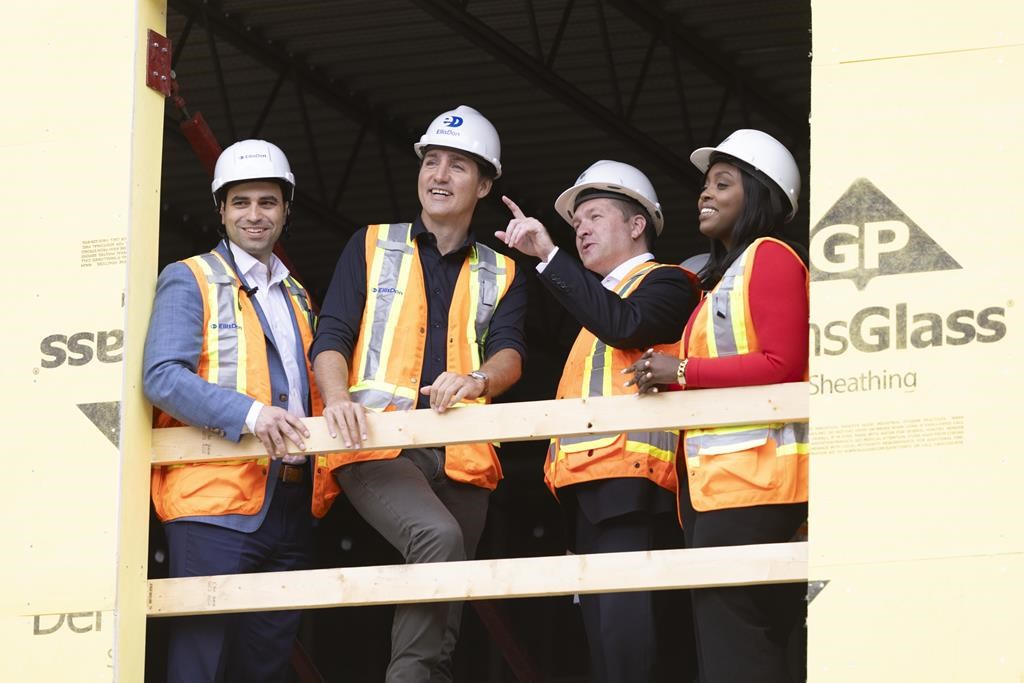Feds unveil first deal for new housing accelerator fund in London

LONDON, Ont. — The federal government is trying to channel the anger it’s facing over the lack of affordable housing into a challenge for municipalities.
The new approach comes as Liberal MPs touch base on why their party is polling at its lowest level since taking government in 2015.
“A new standard has been set and we have new expectations,” Federal Housing Minister Sean Fraser told reporters Wednesday in London, Ont.
Advertisement
“If (municipalities) want the federal government to show up with financial investments that will directly support your ability to build more homes, give us a reason.”
Fraser was speaking at a press conference where Prime Minister Justin Trudeau announced more than 2,000 new housing units could be built in London over the next three years.
It is the first city in the country to sign a deal under the national housing accelerator fund, a $4-billion program first announced in the spring 2022 federal budget, but for which applications weren’t accepted until July.
Trudeau blamed municipalities for the fact it took 17 months to get a single project approved under the program. “You’d have to ask different mayors why it took so long,” he said in French.
The prime minister said London was the fastest to respond to the call for plans that eliminate barriers to getting homes built more quickly, such as zoning rules that limit the kind of housing that can be built in specific areas.
Advertisement
London can tap $74 million in federal funds through its proposal to allow four units to be built on a single property, even in low-density neighbourhoods, and for high-density developments to be built without the need for rezoning.
Trudeau said he was issuing a challenge to other mayors to “step up with their proposals” and “build more homes faster.”
Fraser said the announcement “is going to be replicated in the weeks and months ahead” and urged municipalities to allow housing near transit and universities.
Yet Trudeau would not commit to meet a target outlined Wednesday by the Canada Mortgage and Housing Corp., which said the country will be short about 3.5 million homes by the end of the decade, compared with what’s needed to restore affordability.
And both Fraser and Trudeau refused to say what would be an acceptable average cost for a home, with Fraser urging against “simplistic metrics about average home prices,” saying he’s instead focused on how many homes are available at varying price points.
Advertisement
The Liberals are facing heavy pressure — from Canadians, political opponents and even their own MPs — to respond to a housing shortage that has been compounded by two years of high inflation.
Affordability issues are expected to be in the spotlight on Parliament Hill this fall, with opposition parties saying the Liberals are slow reacting to a crisis they let fester.
The Conservatives had floated withholding certain federal funds from municipalities with strict zoning laws months before the Liberals announced their own approach Wednesday.
The Tories pointed to a comment from Liberal MP Arielle Kayabaga, who told media this week: “I haven’t been able to purchase a home.” Kayabaga, who was elected in 2021, receives an annual salary of nearly $195,000 as a member of Parliament.
“It appears that members of the Liberal caucus are just now starting to notice what their constituents have been facing for the past eight years,” the Conservatives wrote in a statement.
Advertisement
The NDP blamed the Liberals and Tories for gutting investments in public housing over decades.
Leader Jagmeet Singh called on Trudeau to waive federal taxes on projects to build affordable housing, while helping non-profits buy older properties that are often snapped up by developers.
Earlier on Wednesday, Fraser said that low-income and public housing was Canada’s core need when his government first took office, but “the dynamic has fundamentally shifted” since the COVID-19 pandemic, when house prices soared out of reach for middle-class families.
He said the government is looking at unprecedented measures, working with the private and non-profit sectors.
“We’re going to need to advance measures that are going to help change the financial equation for builders who are dealing with a lot of projects that are actually approved but have been put on pause because of a higher-interest rate environment,” Fraser said.
Advertisement
He said the government will need to be “investing in innovation, like building homes in factories so we can actually be more productive” in housing, and also finding ways to attract immigrants with construction skills to Canada.
The Liberal caucus is meeting in London for a retreat before the House of Commons resumes sitting next week, and Trudeau was expected to get an earful from his MPs about the party’s flagging fortunes in the polls.
Various media reports have quoted backbench Liberals as saying the party isn’t communicating its accomplishments well and that Trudeau isn’t listening to the concerns of MPs who are not in cabinet.
Quebec MP Brenda Shanahan, the Liberal caucus chair, said Tuesday that her fellow MPs are having “very frank” conversations.
Foreign Affairs Minister Mélanie Joly said in French that “sometimes difficult” conversations have helped the Liberals navigate various crises over their eight years in office.
Advertisement
MPs met in regional groups on Wednesday ahead of an all-MPs meeting to talk about issues their constituents have raised, as well as unflattering polling numbers in surveys the Liberals commissioned this summer.
Yet Vancouver-area MP Ken Hardie claimed his constituents are generally feeling positive.
“Whatever the polls are saying, we’re not hearing it at the doors,” he said. “We were expecting to run into some heavy weather; some people are upset. Most people aren’t even paying attention.”
This report by The Canadian Press was first published Sept. 13, 2023.
— With files from Emilie Bergeron
Advertisement
Dylan Robertson, The Canadian Press